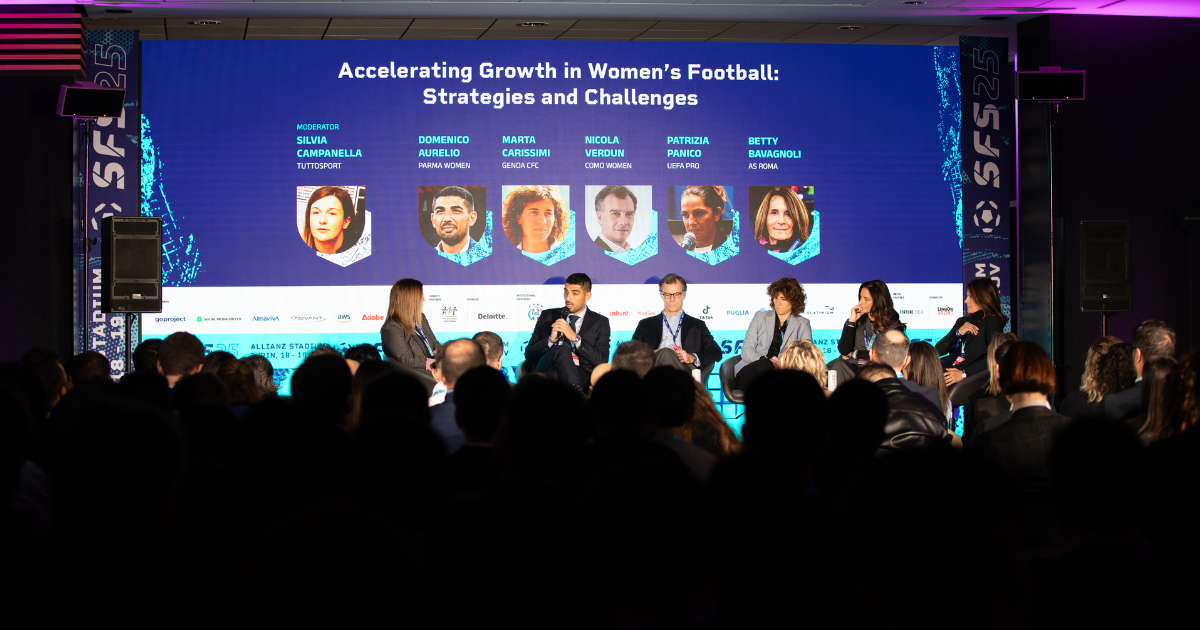
Women’s Empowerment and Professionalism: The Future of Football in Italy
Moderated by Silvia Campanella (TuttoSport), an exceptional panel composed of Domenico Aurelio (Parma Women), Marta Carissimi (Genoa CFC), Nicola Verdun (Como Women), Patrizia Panico (UEFA Pro), and Betty Bavagnoli (AS Roma) discussed the sporting, political, and social impact of women’s football in Italy, contextualized to the current historical moment.
The path towards evolution
The panelists retraced the concrete steps that have led to the current development of the movement. Betty Bavagnoli, building on her experience as a former player and coach, emphasized the importance of international comparison. “The experience as a former player and coach helped me a lot, allowing me to travel, exchange ideas, and see different realities. In my new role, I tried to explain what my vision for women’s football could be: a common idea, a point of reference like the clubs that preceded us, and I believe we are doing a good job in Italy.”
Marta Carissimi, active from 2002 to 2020, highlighted the drastic change in the daily life of athletes. From the days when all teams were amateur and players had to balance their passion with other jobs, the arrival of professional clubs like Juventus, Roma, and Fiorentina provided better infrastructure and training conditions. Patrizia Panico confirmed the statement: “Women’s football has evolved in player performance, youth sectors, and infrastructure. The environment has become professionalized, and there has also been a general evolution abroad.” However, the warning persists that some foreign leagues, once considered behind, have now surpassed the Italian championship model.
Investing with vision: the virtuous models of Parma and Como
Clubs are demonstrating targeted financial and strategic commitment. Domenico Aurelio (Parma Women) illustrated the vision of President Krause: “I shouldn’t just do women’s football, but I want to do it.” At Parma, female players are considered professionals in all respects, with the introduction of important maternity policies, the development of a second team, and attention to post-career support. Nicola Verdun (Como Women) spoke about the “asset value of women’s football, like abroad.” “The revenues are not yet there—they are often shifted to the men’s side—so the revenue model starts from scratch. But the challenges at Como Women are positive; it requires time and the right mindset.”
Verdun insisted on the need for cultural work: “We want to create activities that involve families and children to bring more people closer to women’s football, aware that perhaps there is also cultural work to be done among our fans.”
Attractiveness and narrative: the challenges still open
Professionalism was requested by women not only for equal pay but to gain fundamental rights and protections. To further develop the phenomenon, it is essential to highlight all components of the system and improve its attractiveness. Marta Carissimi noted that the perception of the Italian league abroad needs an upgrade in credibility. “The fact that some of our players are now playing in the two best leagues in the world, the American (National Women’s Soccer League) and the English (Women’s Super League), is lending credibility to the Italian league and to Italian women’s football because, it must be said, over the years, the perception of Italy abroad has not been that of a top league.” Who are we talking about? Sofia Cantore (Washington Spirit – NWSL), Lisa Boattin (Houston Dash – NWSL), Elena Linari (London City Lioness – WSL) and Arianna Caruso (Bayern Munich – Frauen-Bundesliga), all followed by Assist Women, the italian agency dedicated to providing services for women’s football.
These players include Sofia Cantore (Washington Spirit NWSL), Lisa Boattin (Houston Dash NWSL), Elena Linari (London City Lioness WSL), and Arianna Caruso (Bayern Bundesliga), all supported by Assist Women, the structure dedicated solely to providing services for women’s football. Furthermore, investment in human resources is crucial. Domenico Aurelio concluded with the importance of adopting an international approach: “Contributing to women’s football means studying people who do things better than us and contextualizing them in our world. Studying, traveling, and taking inspiration from different areas is an important contribution to the Italian movement.”
Finally, all participants agreed on the urgent need to change the cultural and media narrative surrounding the Italian women’s football movement.



